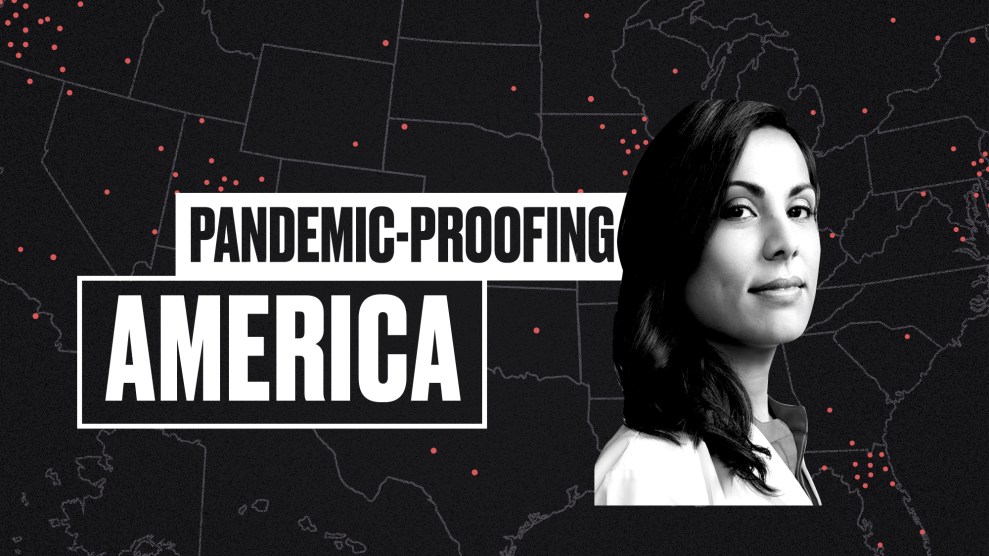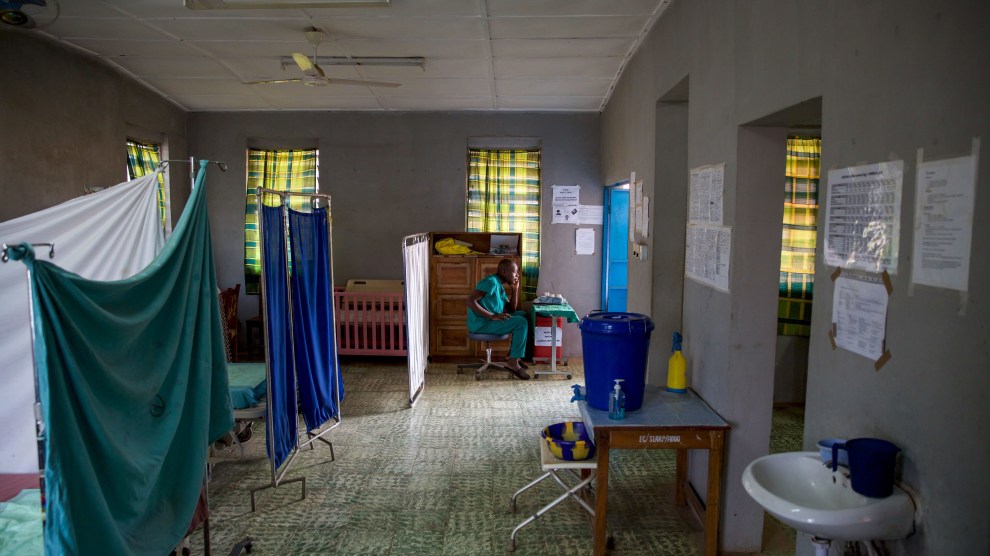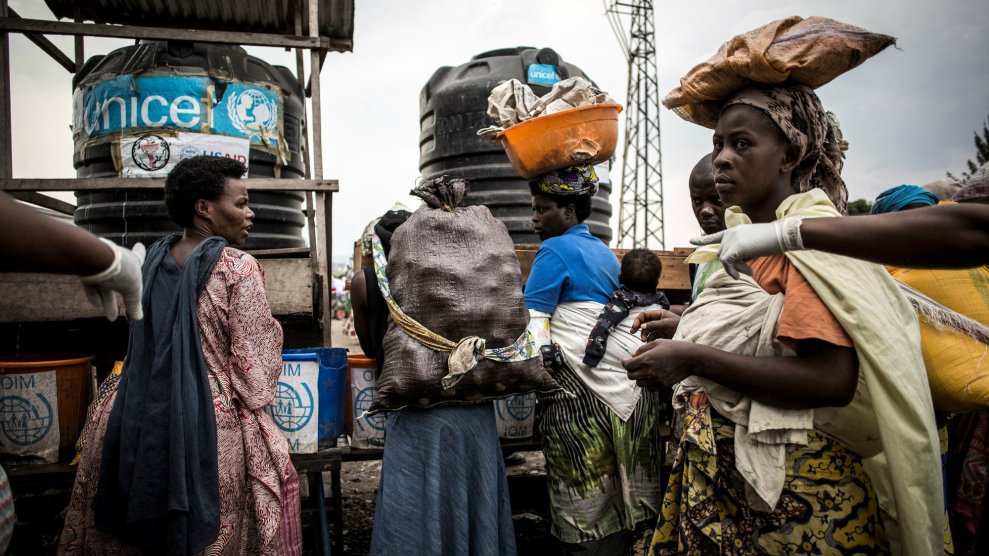
Mother Jones illustration; Courtesy of Mother Jones illustration; Boston University School of MedicineCourtesy of Boston University School of Medicine
As the world grapples with the devastation of the coronavirus, one thing is clear: The United States simply wasn’t prepared. Despite repeated warnings from infectious disease experts over the years, we lacked essential beds, equipment, and medication; public health advice was confusing; and our leadership offered no clear direction while sidelining credible health professionals and institutions. Infectious disease experts agree that it’s only a matter of time before the next pandemic hits, and that one could be even more deadly. So how do we fix what COVID-19 has shown was broken? In this Mother Jones series, we’re asking experts from a wide range of disciplines one question: What are the most important steps we can take to make sure we’re better prepared next time around?
Nahid Bhadelia is an infectious disease physician and medical director of special pathogens unit at Boston Medical Center. For the last nine years, she has directed the medical response program for Boston University’s maximum containment biosafety level 4 lab, one of only two centers of its kind in the United States—the other one is in Galveston, Texas—equipped to study the most highly contagious and dangerous diseases. During the West African Ebola epidemic that began in 2014, she worked extensively on the ground in affected countries—in 2016, she began working with a research and patient care facility in Uganda dedicated to combating viral hemorrhagic fevers like Ebola. In addition to her work in Boston, she now helps run that facility in partnership with Ugandan doctors and scientists. She also leads a project in Liberia that trains local scientists in emerging infectious disease research.
On the importance of US infectious disease work abroad: Let’s look at the humanitarian aspect and then the selfish aspect. I think the two are related, because the way you stop outbreak clusters of infectious diseases from becoming pandemics is that you catch them early. At the tail end of all international surveillance for infectious diseases are the communities that do not have access to care. And in the majority of these settings, when people have febrile illnesses, they don’t get diagnosed. Everything just gets diagnosed as malaria. The good thing that happened after Ebola was the global health security agenda stuff, which increased investments in setting up diagnostics abroad, setting up response structures abroad, setting up surveillance, so that we get an early warning in some way. The other thing that happened in the aftermath of the Ebola epidemic was that ASPR invested a ton of money in identifying Ebola treatment centers in the United States. They invested in hospitals that are taking care of Ebola patients to make them into the National Emerging Special Pathogen Training and Education Center, a group that evaluates everybody else’s readiness. So that’s the humanitarian reason: We need to catch these outbreaks early.
Here is the selfish reason: If you want to make any headway in figuring out if a medical countermeasure or diagnostic works, you need an outbreak to evaluate these things. If you don’t have a research infrastructure in places where these outbreaks happen, when they happen, you have a really tough time setting up that research in an effective way. You won’t know if something is effective or not unless you can deploy it in an ethical way, where you can actually test efficacy. It helps the country that’s affected, and it helps us. And that’s why the Department of Defense is actually involved a lot across the board in many different interests in many different ways. They have put in an incredible amount of investment, because they recognize that interdependency between the global and the local.
On why we need to scale up hospitals: Over the last five years, all of us involved in this network of biocontainment care have seen how it’s been great to get some training and awareness and infrastructure into place. But it was an infrastructure that was looking at a disease that causes a small cluster of cases with high mortality, not a disease that causes tons of cases, but not as high mortality. A three-bed biocontainment unit is not going to help you in a case like COVID, where you have hundreds of patients coming in. At a lot of conferences, I keep saying, we may be ready for Ebola, but we’re not ready for avian influenza, which is the equivalent of what we’re seeing with COVID right now.
We need to create greater surge capacity at every level, it can’t just be at these specialized centers. It can’t be an investment during that surge, during a pandemic. It needs to be consistent. It has to be devoid of attachment to a political cycle. A small hospital should have at least the same kind of capacity to handle a surge of infectious diseases, the way a large center does. The other thing, which we have so cruelly realized through this experience, is our supply chain. When the whole world’s supply chain all of a sudden gets impacted, there’s no way to be able to resolve it in time. It requires pre-investment in maintaining the supply chain. That means repatriating the supply chain for personal protective equipment or for certain medications. For example, we saw anesthetic for ventilated patients start running out, so we had to switch to other ones. Boston’s having a big epidemic, but so is New York, and everybody’s market is affected at the same time.
On why PPE needs a major reboot: Personal protective equipment is the same stuff we’ve been using for 30-something years. It’s so uncomfortable. How do you listen to the lungs and heart of a patient when you have all this stuff on your head, and you don’t want to use the same stethoscope that’s dirty on a patient? There’s all this intricate stuff that we go through that limits the amount of time the provider can spend time at the bedside. After Ebola, a couple of models came out—there was one Hopkins model for a new sort of [PPE] suit. We try to reduce the number of things you could get to take off because it’s when people take off their personal protective equipment that they’re most likely to infect themselves. The suit basically allows you to take everything off in two steps. It was full clear-face so you could you could see the face of the patient and they could see you, hear you. And it was lightweight and comfortable. There isn’t enough commercial appeal for it. The specialized centers may think they need it, but what other regular hospitals are going to invest in it?
On why doctors aren’t ready to treat infectious diseases: The next bit is training. Infectious diseases have become so specialized and not even appreciated. We require all physicians to go through advanced life support training, even though most will never see a patient who needs it. There’s some training for infection control, like personal protective equipment, but not enough to make them feel comfortable. We, as a medical field, have to invest in making everybody else have higher levels of competency in dealing with highly communicable infectious diseases.
Why isn’t that a bigger part of every curriculum? I think we need to accept the fact that we live in an age of pandemics, that this is going to continue happening, maybe not at the same scale, but we will continue to see these types of threats because that’s the environment we’ve created. This combination of human activity and population and degradation that we’re seeing with natural reservoirs, we’re going to continue to see new diseases spill over.
On why the United States should not pull out of the World Health Organization: WHO is not a perfect organization, but it is the only international infrastructure that we currently have that creates the platform on top of which sovereign nations can collaborate, and share data and technical expertise. There is nothing else like that out there. And so, for us to pull out of that basically means that we need to depend on bilateral relationships with countries you know, or regional organizations. It’s just shooting ourselves in the foot.
This interview has been edited for length and clarity.

















